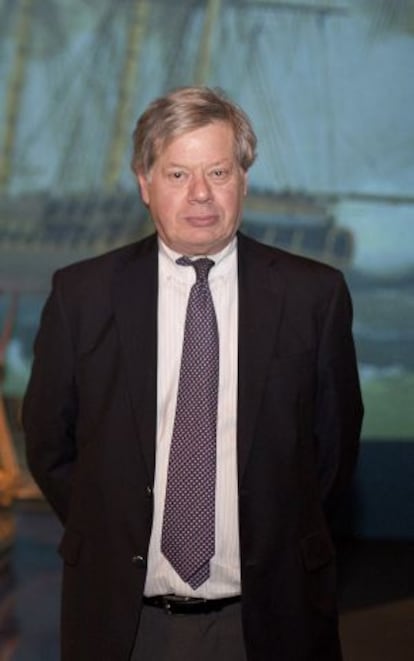Confessions from the Odyssey case
The US lawyer who won the ‘Mercedes’ wreck coins back for Spain reveals it all


Without the legal efforts – and a little muscle work – by Washington-based lawyer James Goold, Spain would probably never have recovered the 574,553 antique Spanish coins that private treasure hunters brought up from the 19th-century shipwreck, Nuestra Señora de Las Mercedes.
Thankfully for him, Goold did not have to physically carry all the silver and gold coins back from the US to Spain himself. But one hot summer day, the international law expert did have to transport a tub filled with about 300 coins and other objects taken from the shipwreck by Odyssey Marine Exploration from Gibraltar to Spain on his own.
Spain and Odyssey engaged in a seven-year legal battle over the coins that Goold eventually won for the former at the US Supreme Court.
After the treasure-hunting firm found the hoard at the bottom of the Atlantic off the Algarve in early 2007, it hid about 300 coins and other objects in a warehouse in Gibraltar. The rest of the shipment was secretly airlifted to Tampa, Florida, where Odyssey is headquartered.
Goold had to ask the Gibraltarian authorities to release the coins. On the other side of the border, he knew he had all the resources, including legal aid, he needed to move them. But in the British colony – where diplomatic relations with Spain are frosty – Goold had to do it all alone.
Odyssey hid the coins in Gibraltar because they could have proved the treasure came from the Mercedes
“I knew that the Civil Guard was on the other side waiting to help me, but they couldn’t get in [Gibraltar],” Goold explained during a recent conference at the National Archeological Museum in Madrid.
Throughout the entire seven-year legal battle in the US over the coins held on American soil, Odyssey hid the fact that it was still storing a smaller hoard in Gibraltar. The Gibraltar court eventually ruled in favor of Spain, saying that the treasure belonged to the Mercedes, a Spanish navy frigate that was sunk by the British in 1804.
Odyssey had kept the coins and other objects hidden in Gibraltar because they could have lent proof to the fact that the treasure hoard came from the Mercedes. “That is the real reason why they kept them under wraps; not because of their value,” said Elisa de Cabo, deputy director of the Protection of Historic Heritage bureau at the Education and Culture Ministry.
Throughout the legal fight, Odyssey’s lawyers argued that there was no solid proof that the treasure it found came from a Spanish shipwreck, much less the Mercedes.
Although the litigation was long and difficult, Goold was always confident Spain would win. There were some delicate moments, like the time they found among the artifacts a 16th-century cannon from the period of the Spanish Armada, something unusual on a 19th-century frigate. “What’s this doing here? It was a trying moment,” he recalled during a talk at the museum about the legal battle.
But thanks to records kept at the Naval Museum in Madrid, the General Archive of the Indies in Seville, and other depositories, it was discovered that the cannon was in fact on the Mercedes when it sunk.
“When it was announced that the ship was indeed the Mercedes, [Odyssey] began looking for people in Latin America and Spain who were descendants of those who had property on board the ship, and then signed contracts with them to help them reclaim their rights,” Goold said. But that effort failed when it was also discovered in the records that Spain had years ago compensated those who lost items or property on board.
Odyssey tried to prove that the Mercedes was not an official royal frigate but a private transport ship
Odyssey had tried to prove in the US courts that the Mercedes was not an official royal frigate but had been a private transport ship ferrying passengers and letters from the New World back to Spain. But records showed that it did indeed belong to the Spanish government.
In an interview, Goold said Odyssey had tried to win the support of different Republican Party lawmakers in Florida and “hired former State Department employees to try to influence officials” in Washington.
“They tried to create a network of friends and acquaintances who charged them to exert influence, but even those politicians realized that Spain was right in its arguments,” he said.
Tu suscripción se está usando en otro dispositivo
¿Quieres añadir otro usuario a tu suscripción?
Si continúas leyendo en este dispositivo, no se podrá leer en el otro.
FlechaTu suscripción se está usando en otro dispositivo y solo puedes acceder a EL PAÍS desde un dispositivo a la vez.
Si quieres compartir tu cuenta, cambia tu suscripción a la modalidad Premium, así podrás añadir otro usuario. Cada uno accederá con su propia cuenta de email, lo que os permitirá personalizar vuestra experiencia en EL PAÍS.
¿Tienes una suscripción de empresa? Accede aquí para contratar más cuentas.
En el caso de no saber quién está usando tu cuenta, te recomendamos cambiar tu contraseña aquí.
Si decides continuar compartiendo tu cuenta, este mensaje se mostrará en tu dispositivo y en el de la otra persona que está usando tu cuenta de forma indefinida, afectando a tu experiencia de lectura. Puedes consultar aquí los términos y condiciones de la suscripción digital.








































